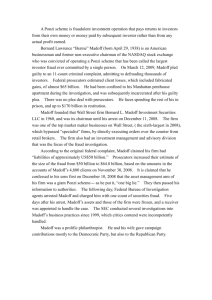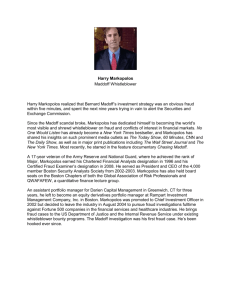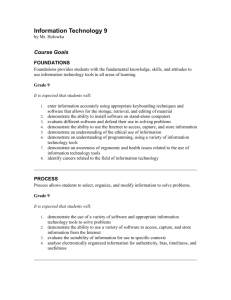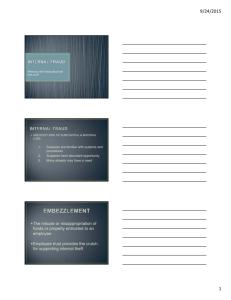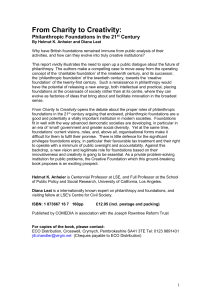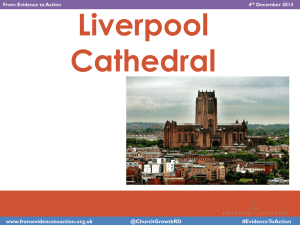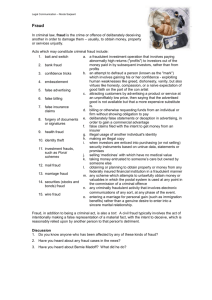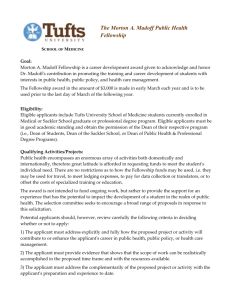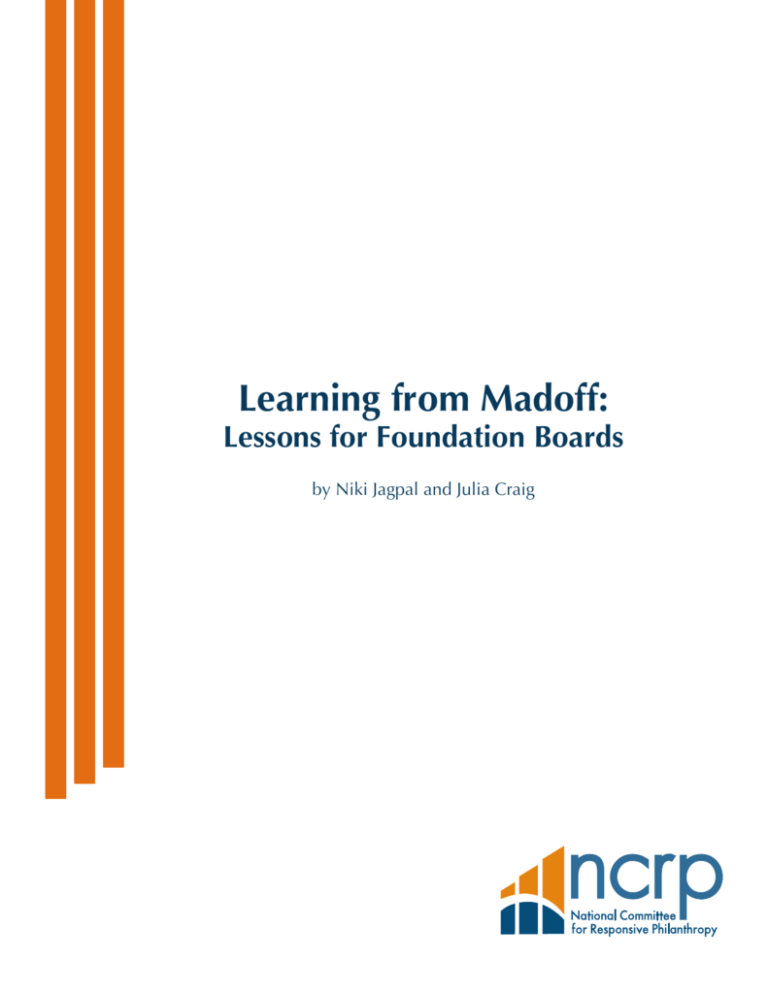
Learning from Madoff:
Lessons for Foundation Boards
by Niki Jagpal and Julia Craig
Learning from Madoff: Lessons for Foundation Boards
O
n 12 March 2009, the now infamous Bernard L.
“Bernie” Madoff, pleaded guilty to a multi-count
criminal complaint after admitting that he defrauded
thousands of investors in what many consider to be the
single largest investor fraud committed by one person.
The media have followed the developments closely since
Madoff’s arrest on 13 December 2008, and there has
been considerable interest throughout the nonprofit sector
regarding the extensive impact of the fraud on charitable
organizations.
trustees.2
3. A mere 16 (15 percent) of these 105 foundations
had boards comprising five or more individuals,
the minimum board size recommended by NCRP;
38 foundations listed only one or two trustees, and
46 foundations listed three or four trustees.
4. Of the 16 foundations with five or more trustees,
an analysis of trustee names shows notable
homogeneity.3
The listing of foundations and trustees begins on page 6.
In March 2009, the National Committee for Responsive
Philanthropy (NCRP) released Criteria for Philanthropy at
Its Best: Benchmarks to Assess and Enhance Grantmaker
Impact, which proposes aspirational goals we recommend
as a means to advance our philanthropic community. In
Criteria, we included a chapter on Ethics that covers how
“a grantmaker practicing Philanthropy at Its Best serves
the public good by demonstrating accountability and
transparency to the public, its grantees and constituents.”
By way of comparison, it is useful to consider some
recent studies that have been released about foundation
boards. In January 2006, the Council on Foundations
(COF) released a Board Briefing document on board size
for its members. At that time, its most recent Foundation
Survey found that the median overall board size for
Council members was 11. That survey identified numerous
influential factors associated with board size, including
type of grantmaker and asset size. Community foundations
As this white paper shows, the Madoff scandal provides
tended to have larger boards, with a median size of 16,
additional evidence of the relevance of NCRP’s recomand family foundations tended to have smaller boards,
mendation that foundations have larger, more diverse
with a median size of seven. However, the majority of the
boards, that they maintain policies and practices that
COF survey sample comprised larger foundations: 78.5
support ethical behavior (e.g. maintaining a written invest- percent of respondents had $10 million or more in assets.
ment policy) and that they disclose information freely.
A study of grantmakers with three or fewer staff by the
Association of Small Foundations (ASF) found the median
KEY FINDINGS AND COMPARATIVE DATA
number of board members among survey respondents
was five. The median asset size of respondents was
NCRP conducted additional research on a list of
$8.3 million and nearly two-thirds of respondents were
foundations that invested with Madoff, originally compiled family foundations.4 A broader survey conducted by
by Daniel Smith for Nicholas Kristof’s blog in The New
the Foundation Center (FC) in 2005 included 20,429
York Times. We examined board size and diversity to
foundations with at least $1 million in assets. Only 22
determine whether there was any correlation between
percent of those foundations had assets of $10 million or
board composition and exposure to Madoff. Our analysis
more. The respondents had a median board size of three
found a clear association among several aspects of
and a mean board size of 4.4.
these institutions and the goals we established under
our recommendations for ethical practices. Below is a
The 105 most affected foundations were, as Kristof
summary of NCRP’s key findings:
describes them, among Madoff’s “poorer foundations” and
appear to have been primarily family foundations with a
1. One hundred five foundations (71 percent) of the
median total asset size of $3,235,430. This is significantly
close to 150 foundations in the Times’ dataset lost lower than that of the typical COF and ASF member, and
between 30 and 100 percent of their assets due to more closely resembles the majority of foundations in the
investments with Madoff.1
FC survey.
2. The median board size among these 105
foundations was three, with a range of 0-7 total
2
www.ncrp.org
TRUSTEE RESPONSIBILITY
Recent reports have raised the issue of trustee
responsibility and documented the ways that Madoff
exploited relationships of trust with members of the
foundation community to advance his scheme. Some
of the most relevant explorations of the scandal and its
implications include:
•
•
•
•
•
Ben Gose reported in mid-January in The
Chronicle of Philanthropy that “Attorneys general,
lawyers representing the very charities the board
members serve, and possibly even the Internal
Revenue Service could go after [trustees] under
an array of state and federal laws that impose a
fiduciary duty on board members and require
them to act prudently when making investment
decisions.”
Nicholas Kristof blogged about the Madoff scandal
in The New York Times in late January and stated
that he was sharing estimates of total charitable
losses of close to 150 foundations generated by
Daniel E. Smith publicly because “this is a matter
of public concern: These foundations serve the
public interest, and if the non-profits that rely on
them have been financially crippled, we should
get a heads up.”
Rick Cohen, national correspondent for Nonprofit
Quarterly and former executive director of NCRP,
wrote an incisive piece in early January 2009
on the lack of due diligence among foundation
boards that have closed, highlighting the
homogeneous nature of many family foundation
boards that were affected significantly by their
investments with Madoff.
Melissa Berman of Rockefeller Philanthropy
Advisors cautioned attendees of a session at the
Council on Foundations 2009 Annual Conference
in May regarding Ponzi schemes. Part of the
session focused on the “trust deficit” that has
developed following Madoff. Berman emphasized
that when it comes to financial advisors, a
foundation must ask itself, “Can I fire this person
comfortably?”5
Dr. Jeffrey R. Solomon, president of the Andrea
and Charles Bronfman Philanthropies, addressed
trustee responsibility in a recent newsletter issued
•
by 21/64, one of the foundation’s operating
programs. Solomon wrote, “[T]he hard lesson we
are learning is that individuals and foundations
must become less passive and more strategic in
stewarding their investments.”6
Rabbi Mark Borovitz, a former alcoholic and
scammer whose Los Angeles-based foundation
lost between $200,000 and $300,000 to Madoff
dubbed the violation of trust an “affinity theft” in
a recent article published in Vanity Fair. In the
rabbi’s words: “Whether it’s Latino, or black or
Jewish or Christian, everybody wants to trust their
own. … He took advantage of every vulnerability,
because he knew our vulnerable spots.”7
Simply put, reputational reference and reputational trust
trumped due diligence in this situation.
While he did not fault the foundations for having done
anything wrong, Rick Cohen suggested a lack of due
diligence and the governing board’s fiduciary duty
to protect tax-subsidized dollars in his analysis of the
situation. Cohen stated: “It may be time to turn a very
tough eye on family foundations, large and small, where
the stewardship of tax exempt moneys is left to a handful
of people all with the same surnames.” Ben Gose, like
Kristof, reported that trustees were not being accused of
collusion with Madoff but cited Jack Siegel, a Chicago
lawyer who advises charities, as noting that many financial
investment managers chose not to invest with Madoff
because the consistent, high returns on investments made
via Madoff’s business seemed improbable. Siegel stated
that “If [trustees] did their due diligence but came to a
different conclusion about Madoff— you can’t fault them
for that. It’s all about process. The question is, did they
do what normally would be done in selecting investment
managers?” Gose provides the example of Yeshiva
University, which lost a $14.5 million investment that it
made via a trustee who was the head of Ascot Partners;
the firm invested the entirety of the fund with Madoff.
The Picower Foundation has so far been counted among
the most notable victims of the Madoff scheme; it lost all
of its nearly $1 billion endowment. However, emerging
information indicates that Jeffry Picower may have been
complicit in the Ponzi scheme. The New York Times and
Wall Street Journal have recently reported that $12 billion
National Committee for Responsive Philanthropy
3
Learning from Madoff: Lessons for Foundation Boards
was withdrawn from the accounts of Madoff’s investors
in 2008, including $5.1 billion by Mr. Picower. Irving H.
Picard, the court-appointed trustee overseeing the Madoff
bankruptcy, is suing Mr. Picower and other investors to
recover the withdrawn funds in order to redistribute them
to all victims of the scheme. The lawsuit alleges that the
investors who withdrew funds should have realized that
their returns were too high. The case against Mr. Picower
also accuses him of colluding with Madoff to perpetuate
the Ponzi scheme and details accounts showing annual
returns, some of which were backdated, of up to 950
percent. William D. Zabel, lawyer for the Picowers and
a trustee of the Picower Foundation, has denied the
allegations.
The Betty and Norman F. Levy Foundation had total
assets of $244,389,849 and total exposure to Madoff
is estimated at 100 percent. The foundation had three
trustees, Betty and Norman Levy’s son, daughter, and
daughter-in-law. Vanity Fair reported on the way in
which Madoff exploited his close personal relationship
with the late Norman F. Levy. Levy was a leading light of
Jewish wealth and philanthropy; his blessing by entrusting
Madoff with much of his philanthropic and personal
fortune led other foundations and investors to do the
same. This foundation also funded the now defunct JEHT
Foundation,8 established by the Levy’s daughter, which
closed because of the institution’s financial reliance on the
Levy Foundation.
CONCLUDING OBSERVATIONS
NCRP, like Gose and Kristof, believes that most trustees at
foundations impacted by their Madoff investments neither
acted in bad faith nor colluded with Madoff. We believe
also that, in most cases, trustees should not be held liable
financially for falling victim to Madoff’s scheme.
However, the list of trustees compiled by NCRP shows
significant homogeneity among the trustees, even among
the selection of the 16 foundations referenced earlier that
had boards of at least five or more individuals. This raises
the relevant question of whether homogeneous groups can
be expected to make the best decisions about investment
strategies. As NCRP notes in Criteria, recent research by
University of Michigan professor Scott E. Page shows a
significant correlation between diverse groups and better
4
www.ncrp.org
decision-making and problem-solving, even when ability
is controlled for. Given this research, it is likely that a
more diverse group could have avoided poor investment
decisions, clouded by relationships of trust.
Therefore, NCRP recommends that foundation boards
have at least five members with diverse perspectives and
backgrounds.
This means, for example, expanding board membership
by adding people who have different life experiences and
who may consequently view issues before the foundation
with a different lens. Many foundations have found value
by adding the grantee or constituent perspective to their
decision making. As NCRP noted in an article published
in the spring issue of the Nonprofit Quarterly, many family
foundations’ boards have found benefit by diversifying
in this way; it is possible that the foundations analyzed
here could have avoided their over-reliance on their trust
in Madoff by including external and more disinterested
points of view.
Additionally, maintaining policies and practices that
support ethical behavior and disclosing this information
publicly can help retain the public trust and ensure
ethical stewardship of a foundation.
Such policies and practices include, but are not limited
to: maintaining and implementing conflict of interest and
whistleblower policies; subscribing to any of the numerous
available codes of ethical conduct and good governance
for nonprofit organizations; and sharing demographic
information on a foundation’s trustees and staff. Some
exemplary grantmakers noted in Criteria already do
this. Public charities must now report governance and
management policies on the IRS’s form 990,9 but these
revisions were not made to the 990 PF form filed by
private foundations.
In sum, the Madoff foundations scandal offers evidence
of the importance of the strategic and deliberate ethical
practices suggested in Criteria for Philanthropy at Its Best.
Although aspirational, the goals clearly have practical
implications. Because of the limitations of 990 PF forms
and other publicly available data noted by NCRP and
Cohen’s analyses and previous work, pinpointing a
causal relationship between the homogeneity among the
trustees of those foundations victimized by Madoff and
5. “‘Trust Deficit’ Erupts after Madoff Scandal,” The
poor investment decision-making is difficult, although a
Chronicle of Philanthropy, Conference Notebook,
strong associative relationship is clear. Diversifying board
May 6, 2009 http://philanthropy.com/news/
composition is not a panacea, but it offers a practical
conference/8133/trust-deficit-probed-in-wake-ofsolution to prevent abuses of the public trust brought to the
madoff-investment-scandal; Kaberi Banerjee-Murthy,
fore by this analysis. Moreover, implementing and publicly
“Teachable Moments,” Re: Philanthropy Blog, http://
disclosing due diligence processes, ensuring no conflicts of
www.cofinteract.org/rephilanthropy/?p=456#mo
interest and establishing whistleblower protection policies
re-456.
could also diminish the prospect of foundation assets
6. Jeffrey R. Solomon, “Letter from the Editor,” 21/64
Newsletter, Vol. 11 2009, http://www.2164.net/PDFbeing so vulnerable to fraud and abuse.
newsletters/2164_newsletter_v11.pdf.
7.
Vanity Fair describes “affinity theft” as a scheme in
ENDNOTES
which “the con man preys on the idea that you can
trust your own people.” Mark Seal, “Madoff’s World,”
1. Kristof’s piece notes data limitations of Smith’s data
Vanity Fair, March 2009, http://www.vanityfair.com/
sources—foundation tax filings. Although the list of
politics/features/2009/04/madoff200904.
“potential Madoff exposure” is based on returns from
8. In existence since April 2000, the JEHT Foundation’s
2006 and 2007, in some cases they are “imputed
name is an acronym for justice, equality, human
‘best guess’ estimates” but they give a general sense
dignity, and tolerance, “the core values that underlie
of the exposure to Madoff’s Ponzi scheme that the
the Foundation’s mission.” In a statement released
foundations might have had at the time that the returns
by Robert Crane, President and CEO of JEHT, on
were filed. However, he also notes that according
December 15, 2008, Crane noted that JEHT’s board
to Smith, “the figures may understate the exposure,
“deeply regrets that the important work that the
because they don’t include sums channeled indirectly
Foundation has undertaken over the years is ending
to Mr. Madoff through ‘feeder funds.’”
so abruptly. The issues the Foundation addressed
2. Of the 16 foundations with five or more board
[reforming the criminal and juvenile justice systems;
members, nine had five trustees; six had six trustees,
ensuring U.S. compliance with international rule
and one had seven.
of law, and election protection, fair representation
3. Some notably homogeneous boards include: the Chais
and voting transparency] received very limited
Family Foundation (100 percent possible Madoff
philanthropic support and the loss of the foundation’s
exposure) with five trustees sharing the last name
funding and leadership will cause significant pain and
“Chais;” the Fishbein Interstitial Cystitist Foundation
disruption of the work for many dedicated people and
(93.4 percent possible Madoff exposure) with five
organizations.” http://www.jehtfoundation.org/news/.
of six trustees sharing the last name” Fishbein;” the
9.
The annual form filed by all non-grantmaking
Albert and Lillian Small Foundation (76.5 percent)
nonprofit charities and some grantmaking public
had five trustees, all with the last name “Small.” NCRP
charities such as community foundations to maintain
staff used 990-PF forms from individual foundations
their tax-exempt status.
to ascertain the total number of board members and
their names. Because of lack of uniformity in the way
this information is reported on a foundation’s tax
filings, some listed no trustee names. Coupled with
Smith’s findings that direct exposure to Madoff was
indeterminate, these foundations (18) are therefore not
included in this analysis.
4. Association of Small Foundations, 2008-2009
Foundation Operations and Management Survey,
Washington, D.C.: Association of Small Foundations,
2008.
National Committee for Responsive Philanthropy
5
Learning from Madoff: Lessons for Foundation Boards
TABLE 1. FOUNDATIONS WITH POSSIBLE EXPOSURE TO MADOFF OF 30% OR MORE BY NUMBER OF
BOARD MEMBERS AND PERCENT OF ASSETS POSSIBLY EXPOSED
Foundation Name
State
Total Assets
Madoff Possible
Exposure
% Assets
Possibly
Exposed
# of Board
Members
Board Member Names
1
Litwin Foundation
NY
$99,793,440
$67, 713,670
67.85
7
Richard Cohen, Leonard
Litwin, Ruth Litwin, Diane
Miller, Carole Pittelman,
Seymour D. Reich, Morton
Sanders
2
Picower Foundation
FL
$958,425,057
$958,425,057
100.00
6
Norman B. Leventhal, Gerald
C. McNamara, Barbara
Picower, Jeffrey M. Picower,
Martin R. Post, William D.
Zabel
3
Phileona Foundation
MN
$54,587,843
$54,577,205
99.98
6
D. Miller, D.J. Miller, J. Miller,
S.D. Miller, S.L. Miller, T.
Sledd
4
Fishbein Interstitial
Cystitist Foundation
NY
$1,600,520
$1,494,165
93.35
6
Jan Fishbein Bernstein, Elisbeth
Fishbein, Kara Fishbein, Laurie
Fishbein, Robert Fishbein,
Steven Goldman
5
Hammerman and
Fisch Foundation
NY
$5,139,487
$3,521,554
68.52
6
Caryn Fisch, Charles
Hammerman, Eleanor
Hammerman, Ira
Hammerman, Michael
Hammerman, Stephen
Hammerman
6
Carl & Ruth Shapiro
Foundation
MA
$323,912,042
$199,666,505
61.64
6
Ellen S. Jaffe, Carl J. Shapiro,
Ruth G. Shapiro, Linda S.
Waintrup, Jean S. Whitney,
Rhonda S. Zinner
7
Aaron Foundation
MA
$12,822,546
$4,442,895
34.65
6
Hope R. Edison, Avram J.
Goldberg, James R. Rabb, Jane
M. Rabb, Betty R. Schafer
8
Chais Family
Foundation
CA
$178,009,106
$178,009,106
100.00
5
Emily Chais, Mark Chais,
Pamela Chais, Stanley Chais,
William Chais
9
Max Zankel
Foundation
MD
$995,032
$995,032
100.00
5
Jerome Gellman, Kenneth
Gellman, Stephen Gellman,
Barry A. Schwartz, Gerald
Schwartz
10
Albert & Lillian
Small Foundation
MD
$11,093,380
$8,490,866
76.54
5
Susan Small Savitsky, Albert
H. Small, Albert H. Small, Jr.,
James H. Small, Shirley Small
6
www.ncrp.org
TABLE 1. FOUNDATIONS WITH POSSIBLE EXPOSURE TO MADOFF OF 30% OR MORE BY NUMBER OF
BOARD MEMBERS AND PERCENT OF ASSETS POSSIBLY EXPOSED (CONTINUED)
Foundation Name
State
Total Assets
Madoff Possible
Exposure
% Assets
Possibly
Exposed
# of Board
Members
Board Member Names
11
Zenkel Foundation
NY
$4,178,659
$2,460,457
58.88
5
Lisa Z. Sheldon, Bruce Zenkel,
Daniel R. Zenkel, Gary B.
Zenkel, Lois Zenkel
12
Dayle & Michael
Katz Foundation
NY
$1,344,803
$734,140
54.59
5
Dayle H. Katz, Gregory Katz,
Howard Katz, Michael Katz,
Todd Katz
13
Katzenberg
Foundation
CA
$22,057,386
$10,534,582
47.76
5
Gerald Breslauer, David
Geffen, Jeffrey Katzenberg,
Marilyn Katzenberg, Michael
Rutman
14
Marion & Robert
Rosenthal
Foundation
VA
$12,442,327
$5,626,706
45.22
5
Jane R. Cafritz, Brooke R.
Peterson, Marion Rosenthal,
Nancy Rosenthal, Robert M.
Rosenthal
15
Kaufman Family
Foundation
MI
$3,730,316
$1,428,704
38.30
5
Robert P. Aronson, Dorothy
Benyas, Alan J. Kaufman,
Steven D. Kaufman, Rober
Naftaly
16
Joseph Persky
Foundation
MA
$8,638,775
$3,190,987
36.94
5
David A. Persky, Marguerite
Persky, Marlene Persky,
Suzanne G. Persky, Warren E.
Persky
17
Lifton Family
Foundation
NY
$2,115,280
$2,115,280
100.00
4
Elinor Lifton, Judie B. Lifton,
Martin Lifton, Steven J. Lifton
18
Lautenberg
Foundation
NJ
$15,000,792
$14,945,462
99.63
4
Fred S. Lafer, Frank R
Lautenberg, Lois Lautenberg,
Eleanore Popeck
19
The Levin Family
Foundation
NJ
$6,016,343
$5,844,361
97.14
4
Alan Levin, David Levin,
Susan Levin, Vivian Levin
20
Charles I & Mary
Kaplan Foundation
MD
$30,188,436
$29,184,803
96.68
4
Edward H. Kaplan, Irene
Kaplan, Jerome Kaplan, Joan
Gindes
21
Edward & Susan
Blumenfeld
Foundation
NY
$2,653,025
$2,539,993
95.74
4
Brad Blumenfeld, David
Blumenfeld, Edward
Blumenfeld, Susan Blumenfeld
22
Greenman Family
Foundation
FL
$2,504,879
$2,330,976
93.06
4
Lester Greenman, Phyllis
Greenman, Stanley Greenman,
Judith Katz
23
Brad Blumenfeld
Family Foundation
NY
$249,947
$221,666
88.69
4
Brad Blumenfeld, David
Blumenfeld, Edward
Blumenfeld, Harvey Cohen
National Committee for Responsive Philanthropy
7
Learning from Madoff: Lessons for Foundation Boards
TABLE 1. FOUNDATIONS WITH POSSIBLE EXPOSURE TO MADOFF OF 30% OR MORE BY NUMBER OF
BOARD MEMBERS AND PERCENT OF ASSETS POSSIBLY EXPOSED (CONTINUED)
Foundation Name
State
Total Assets
Madoff Possible
Exposure
% Assets
Possibly
Exposed
# of Board
Members
Board Member Names
24
Julian J. Leavitt
Family Charitable
Trust
TX
$6,786,201
$5,774,353
85.09
4
Clementine Leavitt, Peter
M Leavitt, S. Robert Leavitt,
Susan Leavitt
25
Braman Family
Foundation
FL
$38,882,271
$32,331,637
83.15
4
Irma Braman, Norman
Braman, Susan B. Lustgarten,
Debra B. Wechsler
26
Lewis Schott
Foundation
NY
$3,930,930
$3,048,832
77.56
4
Victoria De Rothschild, Lewis
M. Schott, Nash W. Schott,
Steven G. Schott
27
Lucy Pang Yoa
Chang Foundation
CT
$581,187
$406,584
69.96
4
Diane Allison, Gladys Brazil,
Charles Loy Hawley, Rosalind
C. Whitehead
28
Judy & Fred Wilpon
Family Foundation
NY
$109,120
$74,362
68.15
4
Fred Wilpon, Jeffrey Wilpon,
Judith Wilpon, Robin Wilpon
Wachtler
29
Sidney & Esther
Rabb Foundation
MA
$9,320,352
$6,078,175
65.21
4
Avram J. Goldberg, Carol
R. Goldberg, Deborah B.
Goldberg, Joshua R. Goldberg
30
Adler Foundation
MD
$5,037,563
$3,208,757
63.70
4
Gail F. Adler, Louis K. Adler,
Marc F. Adler, Robert M.
Hopson
31
Siff Foundation
MA
$2,285,927
$1,224,137
53.55
4
Lawrence Siff, Robert M. Siff,
Shirley S. Siff, Karen SiffExkorn
32
Sidney R. Rabb
Charitable Trust
MA
$20,121,326
$10,733,539
53.34
4
Nancy L. Canners, M. Gordon
Erhlich, Carol R. Goldberg,
Arthur B. Page
33
Tepper Family
Foundation
NY
$669,075
$322,234
48.16
4
Edward M. Tepper, Elise C.
Tepper, Jacqueline G. Tepper,
Marvin B. Tepper
34
Goldberg Family
Foundation
MA
$18,893,466
$7,997,211
42.33
4
Avram J. Goldberg, Carol
R. Goldberg, Deborah B.
Goldberg, Joshua R. Goldberg
35
Allegro Foundation
NY
$957,152
$364,139
38.04
4
Alexander Dichter, Cipa
Dichter, Gabriel Dichter,
Misha Dichter
36
Dextra Baldwin
McGonagle
Foundation
NY
$24,404,318
$7,434,332
30.46
4
David Spanier, Helen G.
Spanier, Jonathan Spanier,
Maury Spanier
37
Richard & Deborah
Felder Foundation
AZ
$2,118,318
$2,118,318
100.00
3
Deborah S. Felder, Jonathan E.
Felder, Richard B. Felder
8
www.ncrp.org
TABLE 1. FOUNDATIONS WITH POSSIBLE EXPOSURE TO MADOFF OF 30% OR MORE BY NUMBER OF
BOARD MEMBERS AND PERCENT OF ASSETS POSSIBLY EXPOSED (CONTINUED)
Madoff Possible
Exposure
% Assets
Possibly
Exposed
$244,389,849
$244,385,384
100.00
3
Hallie D. Cohen, Francis N.
Levy, Jeanne Levy Church
FL
$60,720,344
$60,597,192
99.80
3
Shirley Fiterman, Steven
Fiterman, Valerie Herschmann
Yale Fishman Family
Foundation
NY
$2,452,243
$2,437,008
99.38
3
Joseph Fishman, Yale Fishman,
Rebecca Silverstein
41
Charles & Candice
Nadler Foundation
MN
$545,167
$537,349
98.57
3
Candice Nadler, Charles
Nadler, Alan Eidsness
42
Bennett & Gertrude
Berman Foundation
NY
$3,117,075
$3,063,513
98.28
3
Jeffrey A. Berman, Helaine B.
Fisher, Jeffrey Stavin
43
Robert A. Certilman
Family Foundation
NY
$1,528,828
$1,499,220
98.06
3
Lee Certilman, Robert A.
Certilman, Steven Certilman
44
Yetadel Foundation
AZ
$1,610,327
$1,573,026
97.68
3
Andrew Behar, Julie Behar,
Adele Engel Behar
45
Katherine &
Ronald Takvorian
Foundation
MA
$1,516,390
$1,480,965
97.66
3
Katherine U. Takvorian,
Ronald W. Takvorian, Samuel
E. Upchurch
46
Samson & Halina
Bitensky Foundation
NY
$3,370,940
$3,222,342
95.59
3
Susan Lerner, Beth Myers,
Halina Bitensky
47
Besse & Louise
Bleznak Foundation
FL
$1,244,464
$1,170,040
94.02
3
Alan D. Bleznak, Daniel M.
Bleznak, Kathleen H. Bleznak
48
Zemsky Foundation
c/o Taurus Partners
NY
$4,299,247
$4,040,322
93.98
3
Howard Zemsky, Sam Zemsky,
Shirley Zemsky
49
Heller Brothers
Foundation
FL
$1,451,277
$1,295,124
89.24
3
Barbara H. Freitag, Harvey
Heller, Harry Heller Falk
50
Avery & Janet Fisher
Foundation
NY
$8,075,148
$7,118,379
88.15
3
Charles A. Fisher, Janet C.
Fisher, Nancy Fisher Kirschner
51
Lou & Harry Stern
Family Foundation
NY
$3,952,774
$3,436,555
86.94
3
Lou Stern, Russell Stern,
Theodore W. Tashlik
52
Nathan & Barbara
Greenberg Trust
MA
$1,264,169
$1,079,714
85.41
3
Barbara Greenberg, Nathan
Greenberg, Agnes Kull
53
Werner Foundation
MN
$1,453,251
$1,090,639
75.05
3
Wendy Brown, Jeffery Werner,
Violet Werner
54
Max B. Cohn
Foundation
NY
$5,178,675
$3,845,095
74.25
3
Marcia Cohn, Maurice J.
Cohn, Milton Cohn
55
Jerome & Anne C
Fisher Foundation
FL
$18,283,920
$11,402,514
62.36
3
Jodi Fisher, Joel Kozol, John
Zampino
Foundation Name
State
38
Betty and Norman F.
Levy Foundation
NY
39
Miles & Shirley
Fiterman Foundation
40
Total Assets
# of Board
Members
Board Member Names
National Committee for Responsive Philanthropy
9
Learning from Madoff: Lessons for Foundation Boards
TABLE 1. FOUNDATIONS WITH POSSIBLE EXPOSURE TO MADOFF OF 30% OR MORE BY NUMBER OF
BOARD MEMBERS AND PERCENT OF ASSETS POSSIBLY EXPOSED (CONTINUED)
Foundation Name
State
Total Assets
Madoff Possible
Exposure
% Assets
Possibly
Exposed
# of Board
Members
Board Member Names
56
Potamkin Family
Foundation
FL
$8,362,573
$4,910,110
58.72
3
Peter Paris, Alan Potamkin,
Robert Potamkin
57
J. Gurwin
Foundation
NY
$27,777,119
$15,691,124
56.49
3
Laura Flug, Eric Gurwin,
Joseph Gurwin
58
H. Schaffer
Foundation
FL
$5,276,790
$2,716,520
51.48
3
Andrea B. Shay, Jeffrey R.
Stall, Sonya A. Stall
59
Joan S. Beren
Foundation
KS
$4,641,699
$2,094,765
45.13
3
Adam E. Beren, Joan S. Beren,
Nancy T. Beren
60
Burton P. & Judith R.
Resnick Foundation
NY
$13,464,572
$5,006,216
37.18
3
Burton P. Resnick, Judith B.
Resnick, Steven J. Rotter
61
Margaret &
Richard Lipmanson
Foundation
NY
$26,822,479
$9,401,427
35.05
3
Greg Jobin-Leeds, Gerard G.
Leeds, Liselotte J. Leeds
62
David Gopen
Foundation
MA
$499,337
$155,269
31.10
3
Allen Gopen, Robert Gopen,
Stuart Gopen
63
Marden Family
Foundation
NY
$3,207,181
$3,207,181
100.00
2
Iris Marden, James Marden
64
Steven C. & Susan L.
Fiterman Foundation
MN
$2,083,357
$2,083,357
100.00
2
Steven C. Fiterman, Susan L.
Fiterman
65
Schlichter
Foundation
NY
$1,626,925
$1,625,769
99.93
2
Bernard Maddoff, Peter Madoff
66
Kozloff Family
Charitable Trust
PA
$1,872,824
$1,871,087
99.91
2
Paul J. Kozloff, Lauren Kozloff
Sinrod
67
Noel and Hariette
Levine Foundation
NY
$795,444
$793,874
99.80
2
Hariette Levine, Noel Levine
68
Madoff Family
Foundation
NY
$19,125,499
$19,060,372
99.66
2
Bernard Madoff, Ruth L.
Madoff
69
Randi & Bruce
Pergament
Foundation
NY
$850,679
$847,725
99.65
2
Bruce Pergament, Randi
Pergament
70
Morse Family
Foundation
CA
$1,432,931
$1,426,282
99.54
2
Linda Morse, Sherry Morse
71
Gettinger
Foundation
NY
$5,235,159
$5,207,002
99.46
2
Carol A. Edelson, Robert
Gettinger
72
Westlake
Foundation
NY
$755,069
$750,134
99.35
2
Judith Konigsberg, Paul J.
Konigsberg
73
Rita & Harold
Divine Foundation
CO
$11,782,910
$11,613,959
98.57
2
Amy J. Divine, Rita L. Divine
10
www.ncrp.org
TABLE 1. FOUNDATIONS WITH POSSIBLE EXPOSURE TO MADOFF OF 30% OR MORE BY NUMBER OF
BOARD MEMBERS AND PERCENT OF ASSETS POSSIBLY EXPOSED (CONTINUED)
Madoff Possible
Exposure
% Assets
Possibly
Exposed
$540,688
$532,745
98.53
2
Deyva Schreier, Michael
Schreier
CA
$259,697
$255,785
98.49
2
Gordon Bennett, Kathleen
Carolan
Angel Family
Foundation C/O The
AYCO Co
NY
$2,164,383
$2,131,704
98.49
2
Albert D. Angel, Carole Angel
77
Phyllis & Thomas
Osterman
Foundation
NY
$226,805
$223,085
98.36
2
L. Thomas Osterman, Phyllis
Osterman
78
Ruth & Arthur
Friedman
Foundation
NY
$151,521
$148,724
98.15
2
Arthur Friedman, Ruth
Friedman
79
Patrice and Kevin
Auld Foundation
WA
$1,715,505
$1,669,851
97.34
2
Kevin Auld, Patrice Auld
80
Moscoe Family
Foundation
MN
$713,480
$693,198
97.16
2
Cathy Broms, Thomas Moscoe
81
Kingsley H. Murphy
Family Foundation
MN
$1,430,170
$1,382,234
96.65
2
Katherine B. Murphy, Kingsley
H. Murphy
82
Charles Salmanson
Family Foundation
RI
$1,849,148
$1,779,192
96.22
2
Charles Salmanson, Donald
Salmanson
83
C. Jean & Myles
McDonough
Foundation
MA
$9,815,169
$8,793,292
89.59
2
C. Jean McDonough, Myles
McDonough
84
Andrea & Michael
Leeds Foundation
NY
$7,448,374
$6,669,582
89.54
2
Andrea R. Leeds, Michael S.
Leeds
85
Valerie & Jeffrey S.
Wilpon Foundation
NY
$463,757
$394,924
85.16
2
Jeffrey S. Wilpon, Valerie
Wilpon
86
Broms Family
Foundation
MN
$2,005,612
$1,678,427
83.69
2
Evely Broms, Richard A. Broms
87
Debbie & Richard
A. Wilpon
Foundation
NY
$72,025
$49,575
68.83
2
Debbie Wilpon, Richard
Wilpon
88
Donald Salmanson
Foundation
RI
$5,063,238
$3,265,280
64.49
2
Charles Salmanson, Donald
Salmanson
89
Lederman Family
Foundation
NY
$2,021,074
$1,186,288
58.70
2
Carol Lederman, Mark
Lederman
90
Enfranchisement
Foundation
DC
$16,186,475
$9,208,005
56.89
2
Daniel H. Leeds, Sunita G.
Leeds
Foundation Name
State
74
Schreier Foundation
NY
75
Watershed
Foundation
76
Total Assets
# of Board
Members
Board Member Names
National Committee for Responsive Philanthropy
11
Learning from Madoff: Lessons for Foundation Boards
TABLE 1. FOUNDATIONS WITH POSSIBLE EXPOSURE TO MADOFF OF 30% OR MORE BY NUMBER OF
BOARD MEMBERS AND PERCENT OF ASSETS POSSIBLY EXPOSED (CONTINUED)
Madoff Possible
Exposure
% Assets
Possibly
Exposed
$4,930,133
$1,586,384
32.18
2
Alexis G. Sant, Christine D.
Sant
NY
$4,934,955
$1,586,384
32.15
2
Kristin W. Sant, Michael J. Sant
Code Blue
Foundation C/O
Ashford Advisors
NY
$5,093,286
$1,586,384
31.15
2
Daniel Lee Plummer, Shari
Sant Plummer
94
Studio For Urban
Projects C/O
Ashford Advisors
NY
$5,073,061
$1,561,597
30.78
2
Richard R. Johnson, Alison E.
Sant
95
Divine Family
Foundation
CO
$2,977,604
$2,930,121
98.41
1
Amy J. Divine
96
DOS BFS Charitable
Trust
NY
$2,149,917
$2,106,917
98.00
1
Bettie Stein
97
Robert I. Lappin
Foundation
MA
$7,121,068
$6,175,271
86.72
1
Robert I. Lappin
98
Israel Henry Beren
Charitable Trust
KS
$2,866,800
$2,458,700
85.76
1
Robert M. Beren
99
Aurther I. & Sydelle
F. Meyer Foundation
FL
$3,235,430
$2,726,599
84.27
1
Sydelle F. Meyer
100 Billig Foundation
NJ
$5,160,291
$1,859,920
36.04
1
Gail Billig
101 Horowitz and
Libshutz Family
Foundation
NY
$785,648
$683,435
86.99
-
Unable to determine
102 Michael & Ruth
Slade Foundation
NY
$3,211,432
$2,776,172
86.45
-
Unable to determine
103 Linda & Richard
Horowitz
Foundation
NY
$847,940
$706,388
83.31
-
Unable to determine
104 Small-Alpert Family
Foundation
MD
$11,118,191
$8,490,866
76.37
-
Unable to determine
105 George & Karen
Levy Foundation
MA
$2,419,129
$1,433,400
59.25
-
Unable to determine
Foundation Name
State
91
Ivorybill Foundation
C/O Ashford
Advisors
NY
92
Long Cove
Foundation C/O
Ashford Advisors
93
Total Assets
# of Board
Members
Board Member Names
Note: The legally required minimum number of trustees varies from state to state but is generally 1-3. In some cases, the forms
990PF for a given foundation may or may not include a full list of trustees. A table showing the same foundations by number of
board members and percent of assets is available at http://www.ncrp.org/files/whitepaper-final2-table2.pdf
12
www.ncrp.org
ABOUT THE AUTHORS
Niki Jagpal, NCRP’s research and policy director, has a
broad range of experience working in the nonprofit sector.
Most recently, she worked in the Research Department at
Media Matters for America, a web-based progressive research
and information center. She has worked at the Center for
Community Change, the Center for Juvenile Justice Reform at
Georgetown University, and the Fannie Mae Foundation. Niki
holds a bachelor’s degree in history and cultural anthropology
from Duke University and a master of public policy from
Georgetown University.
Julia Craig is research assistant at NCRP and was a contributing
author to Criteria for Philanthropy at Its Best. Previously,
Julia served as an AmeriCorps VISTA at the Human Services
Coalition, a nonprofit social service and advocacy organization
in Miami, Florida. At HSC, she assisted with policy research
and writing and coordinated the service learning program. Julia
holds a degree in social relations from James Madison College
at Michigan State University.
The National Committee for Responsive Philanthropy (NCRP) promotes philanthropy that
serves the public good, is responsive to people and communities with the least wealth and
opportunity, and is held accountable to the highest standards of integrity and openness.
Copyright © June 2009 National Committee for Responsive Philanthropy. All rights reserved.
For information or copies of this report, or to join NCRP, please contact us at:
2001 S Street NW, Suite 620 | Washington D.C. 20009
Phone: 202.387.9177 | Fax: 202.332.5084 | E-mail: info@ncrp.org | Web: www.ncrp.org

